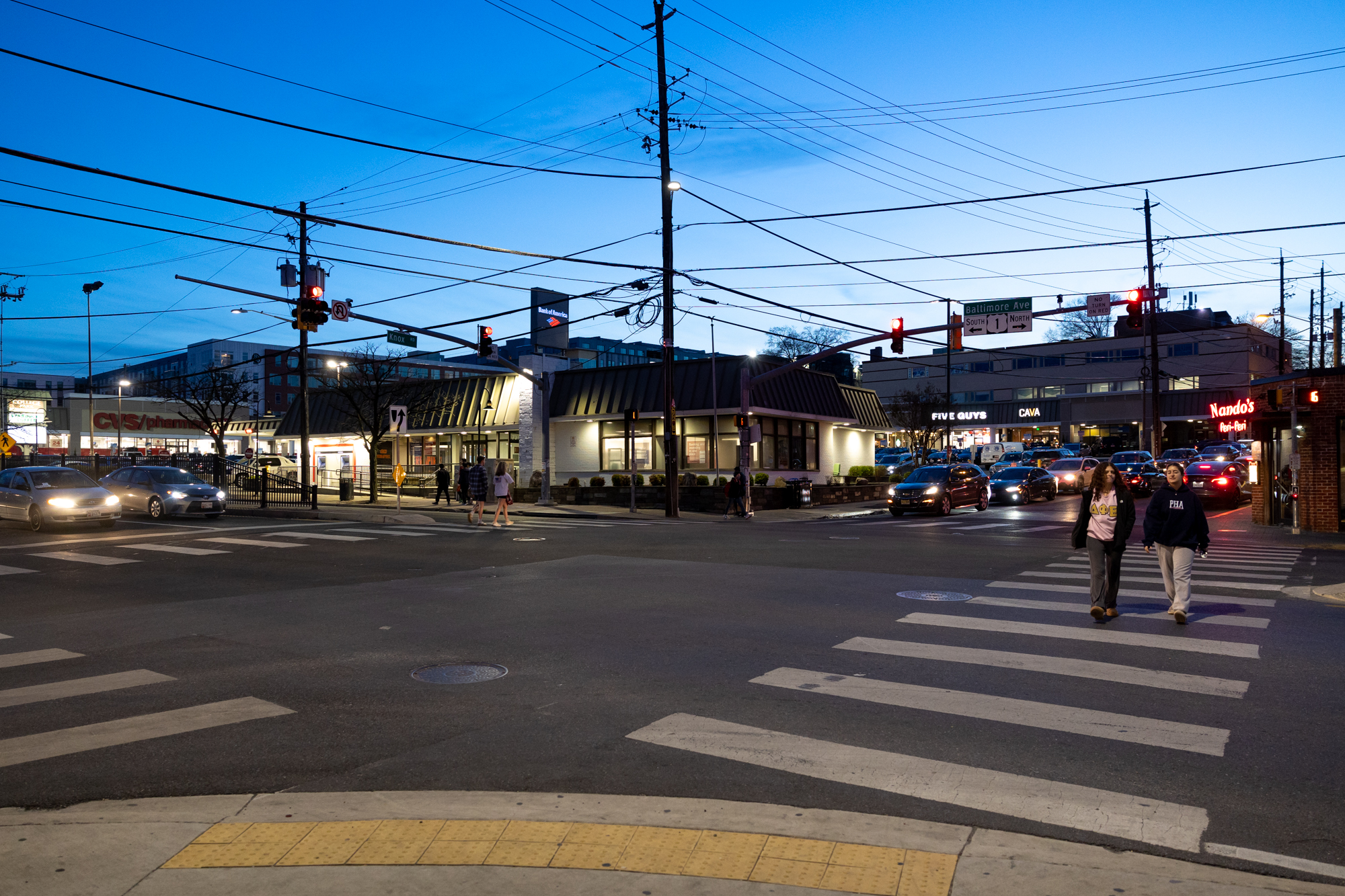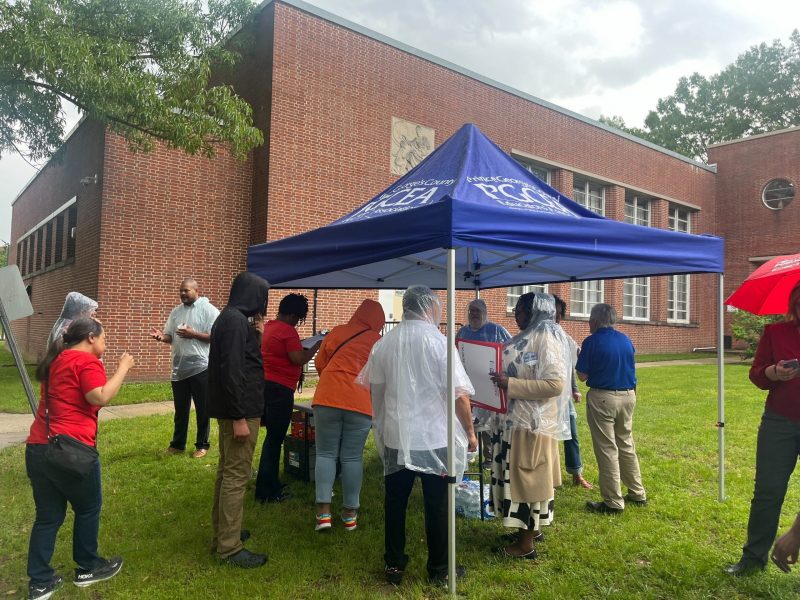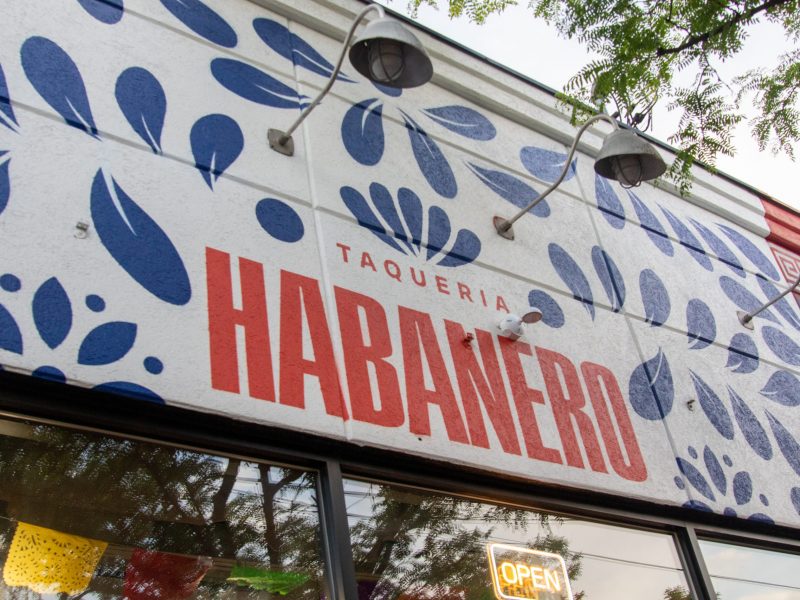Para leer este artículo en español, haga clic aquí.
The city of College Park is taking the first steps toward creating the first pedestrian-only plaza in College Park on Knox Road, between Route 1 and Yale Avenue, to make the downtown area safer and more enjoyable for pedestrians.
The bars and restaurants at the intersection of Knox Road and Route 1 make it an area with heavy pedestrian traffic, especially on weekends. Council member Stuart Adams is pushing to shut down part of Knox Road, either permanently or when the area is busiest, so pedestrians can move freely without worrying about cars.
“Our city still functions, and it functions better when we accommodate pedestrians,” Adams said.
Kenny Young, College Park’s city manager, hired the transportation firm Sam Schwartz to draw initial concepts for the council to consider in the next six months.
Based on the initial plans, the council will consider whether to make a permanent plaza between Route 1 and Yale Avenue or use removable bollards to set up a plaza there on Thursday, Friday and Saturday nights as well as during city events.
Young said the concepts will also consider what impact shutting down the block will have on parking and traffic patterns and take input from Ledo Pizza and Cornerstone Grill & Loft, the two businesses located there.
Most nights, the intersection between Knox Road and Route 1 is packed with student pedestrians enjoying the many restaurants or bars in the area. Route 1 is a state-owned road and a major corridor into Washington, D.C., with heavy traffic, which can make the area hazardous for pedestrians.
Junior economics major Reilly Fay, the president of the Interfraternity Council, said setting up a temporary pedestrian plaza will make the space safer and be useful for philanthropic events.
“We as the IFC really support … making College Park a more walkable area,” Fay said. “We’re certainly, at the time being, in support of that pedestrian plaza development.”
[First College Park planning director retires after 37-year career]
The city has temporarily shutdown Knox Road to make events such as Friday Night LIVE! and Oktoberfest safer. The idea of more frequent or even a permanent closure was discussed as early as when the new city hall building was being designed.
Adams has been pushing to make the plaza happen this year. He said the idea has support from his colleagues, and he is optimistic the pedestrian plaza will be a reality.
“We just have to move forward and not just tread water. Let’s just move forward,” Adams said.
College Park owns Knox Road, so the city would not need to go through county or state government for approval.
Adams, along with city council member John Rigg, represents College Park’s third district, which encompasses most of the downtown College Park area. The city advocates for improving state roads, but Rigg says it’s constantly an issue that the city does not own major roads.
“We’re just frankly told no by the county, ‘No, no, no, no. No, no, no, no, no, no,’” Rigg said.
Rigg said he supports the idea for a plaza on Knox Road because the city has shutdown Knox Road successfully and saw a minimal impact on vehicle traffic.
“It makes a ton of sense,” he said.
[Prince George’s County officials, students address rising youth crime]
Rigg said he wants to make sure Ledo Pizza has access to their delivery vehicles, but he’s confident using removable bollards to set up a pedestrian plaza on weekends would not be disruptive because the city has shut the road down successfully before.
Improving downtown life for students has added benefits for area families. Encouraging students to go to downtown College Park at night rather than socialize in the surrounding neighborhoods improves the residential neighborhood experience in Old Town College Park for nonstudents.
Kate Kennedy, who represents College Park’s District 1 and is running for mayor, said she supports the idea too.
“It’s going to make it so much safer. There’ll be less accidents, [students] will be more comfortable,” Kennedy said.
The residents of Old Town College Park are divided between student renters and permanent homeowners. Homeowners often complain that student residents make too much noise in the evening.
Adams says it is difficult to ask students not to host parties in the neighborhoods without sufficient public spaces available.
“If we want quieter neighborhoods we have to accommodate social spaces for young people,” Adams said.



